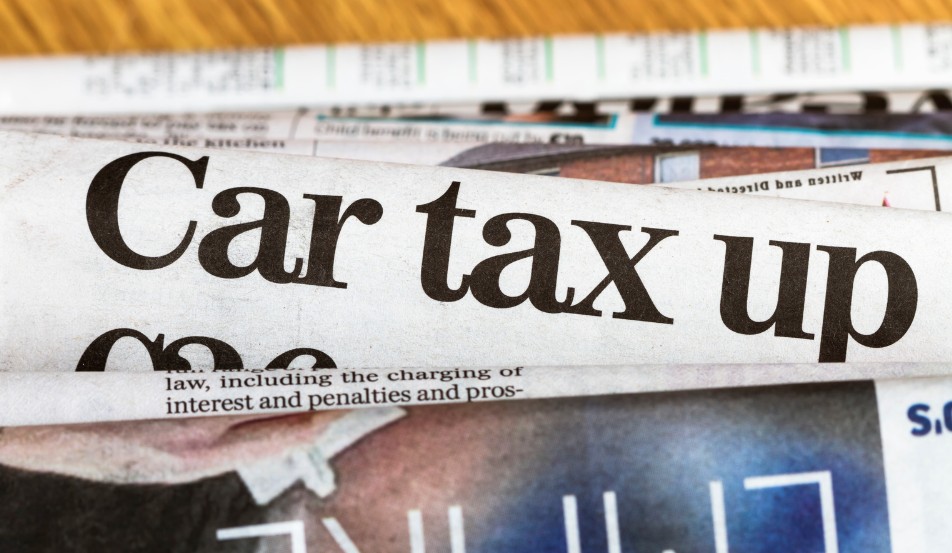Table of Contents
Are you prepared for the upcoming car tax increase 2025? The UK government has announced significant changes to Vehicle Excise Duty (VED), affecting both new and existing car owners.
These changes will impact petrol, diesel, hybrid, and electric vehicles, with some facing higher charges than ever before.
The primary aim is to align road tax rates with carbon emissions, encouraging the shift towards greener transport options.
If you own a high-emission or newly registered vehicle, you could see a notable rise in annual costs. Understanding these updates is essential to avoid penalties and unnecessary expenses.
This guide covers the main changes in road tax, how different vehicle types are affected, penalties for non-payment, and what steps UK drivers should take before the new tax rules come into effect.
What Are the Main Changes in Car Tax Increase 2025?

The 2025 car tax increase introduces several changes to Vehicle Excise Duty (VED), impacting all new and existing vehicle owners.
These adjustments aim to balance tax revenue and encourage drivers to adopt cleaner transport options.
The most significant change is that electric vehicles (EVs) will no longer be exempt from road tax, marking a shift in government policy.
Key Changes in 2025 Car Tax
- Electric Vehicles (EVs) will be taxed for the first time, paying the same standard VED as petrol and diesel cars.
- First-year tax rates for new petrol and diesel cars will increase, especially for high-emission vehicles.
- Vehicles registered after April 2025 will face higher annual tax costs.
- Older diesel vehicles that don’t meet modern emissions standards may be subject to extra charges.
- Standard annual VED rates will rise, affecting all vehicle categories.
These changes make it crucial for drivers to check their vehicle’s tax band to understand their upcoming costs before April 2025.
Why Is the UK Government Increasing Car Tax in 2025?
The UK government is increasing car tax in 2025 to offset revenue losses, support sustainability, and maintain road infrastructure.
As the country moves towards low-emission vehicles, tax revenue from fuel duty is declining.
This has prompted the government to revise VED rates to create a more balanced taxation system.
Reasons for the Tax Hike
- Reduction in Fuel Duty Revenue: The rise in electric and hybrid vehicle adoption is leading to less tax collected from petrol and diesel sales.
- Encouraging Sustainable Transport: The government is using tax incentives to push drivers towards low-emission and electric cars.
- Aligning EV Taxation with Other Vehicles: Since electric cars are no longer niche, the government is ending tax exemptions to balance the system.
- Road Maintenance & Infrastructure Costs: The increased tax revenue will help fund transport projects and improve road conditions.
While this tax increase affects all UK drivers, the government sees it as a necessary step towards a long-term sustainable transport policy.
Are Electric Vehicles (EVs) Still Tax-Free in 2025?

No, from April 2025, electric vehicles (EVs) will no longer be tax-free in the UK. The government is removing the EV exemption as electric cars have become more common.
EV owners will now be required to pay Vehicle Excise Duty (VED) like petrol and diesel vehicles.
While the first-year tax remains lower for EVs compared to high-emission cars, they will still face annual road tax charges.
This change is designed to balance tax revenues as more people switch to electric cars. Despite the new tax, EVs remain cost-effective due to lower running costs, reduced fuel expenses, and fewer maintenance needs.
Even with the added tax burden, they still offer financial and environmental benefits. Drivers should check the updated VED rates before April 2025 to understand the exact costs they will face.
Do Hybrid Vehicles Get Tax Benefits?
Hybrid vehicles still receive some tax benefits, but VED discounts are being phased out. While they are still cheaper to tax than petrol and diesel cars, the savings are gradually decreasing.
Mild hybrid (MHEV) and plug-in hybrid (PHEV) models continue to enjoy lower first-year tax rates due to their lower emissions.
However, the tax gap between hybrids and traditional fuel cars is closing, making hybrids less of a tax-saving option.
Drivers should check their hybrid model’s CO₂ emissions to understand how much tax they will owe under the new system.
While hybrids still provide a balance between fuel efficiency and lower emissions, they no longer offer major tax advantages over fully electric vehicles.
As the UK moves towards full electrification, hybrid owners should prepare for further tax changes in the coming years.
Which Cars Will See the Highest Tax Increases?

From April 2025, certain vehicles will face significant road tax increases due to updated Vehicle Excise Duty (VED) rates.
The changes primarily target high-emission and older vehicles, ensuring that owners of more polluting cars contribute more towards environmental costs.
If you own one of the following vehicle types, you may see a noticeable increase in your road tax:
Luxury and High-performance Cars
Vehicles with CO₂ emissions over 200g/km will be hit with higher VED charges. This includes sports cars and premium models that consume more fuel.
Older Diesel Cars
Diesel vehicles that do not meet the latest Euro 6 emissions standards will face additional tax hikes, as they contribute more to air pollution.
Large SUVs and Fuel-inefficient Vehicles
Bigger cars with high fuel consumption will face increased annual road tax due to their higher CO₂ emissions. The tax hike aims to discourage the use of gas-guzzling vehicles that contribute more to pollution.
Certain Plug-in Hybrids
Some PHEVs with higher CO₂ emissions may lose existing tax breaks, making them more expensive to own. As hybrid technology evolves, only the most eco-friendly models will continue to benefit from lower VED rates.
Checking your car’s tax band now can help you prepare for these upcoming changes.
What Are the Penalties for Not Paying the New Car Tax?
Failure to pay road tax in 2025 can lead to severe financial and legal consequences.
The DVLA (Driver and Vehicle Licensing Agency) actively monitors unpaid VED, and enforcement measures can be strict for those who fail to comply.
Vehicles found without valid tax can be clamped, towed, or impounded, leading to expensive release fees.
If road tax remains unpaid, fines of up to £1,000 may be issued, and repeat offenders could face even higher penalties.
In some cases, unpaid VED can also impact insurance claims, as driving an untaxed vehicle may violate insurance policy terms.
The DVLA conducts roadside checks and uses Automatic Number Plate Recognition (ANPR) cameras to track vehicles without road tax.
To avoid penalties, vehicle owners must ensure they renew their car tax before the deadline. Payment can be made online, by Direct Debit, or at a Post Office.
How Can You Check Your Vehicle’s 2025 Tax Rate?

Want to know how much you’ll pay for car tax in 2025? Here are the best ways to check your updated Vehicle Excise Duty (VED) rate:
Visit the Official UK Government Website
Head to the DVLA website and enter your registration number to check your latest tax rate. This official tool provides accurate VED updates based on your vehicle details.
Check Your Vehicle Logbook (V5C)
Your V5C document lists your current tax band and emissions data. Comparing this with the 2025 tax changes will help you estimate your new rate.
Use Online Tax Calculators
Various motoring websites offer VED calculators to estimate your tax costs. These tools consider factors like CO₂ emissions, fuel type, and vehicle age.
Contact the DVLA for Clarification
If you’re unsure about your new tax band, call or email the DVLA for an official confirmation. They can provide specific details based on your car’s registration.
By checking your tax rate before April 2025, you can avoid surprises and budget for any increases in advance.
By staying informed and checking your VED rate before April 2025, you can avoid unexpected costs and prepare for the new tax changes.
Will There Be More Car Tax Increases After 2025?
Yes, further road tax increases are expected beyond 2025. The UK government is shifting towards a taxation model that discourages high-emission vehicles and supports greener transport initiatives.
Petrol and Diesel Cars Could Face Additional Tax Hikes
- As the UK moves towards phasing out new petrol and diesel cars by 2035, tax rates on these vehicles will likely continue to increase.
Higher VED Rates for All Vehicles
- Annual road tax may rise for all vehicle categories, including hybrids and electric cars, to balance tax revenue as fuel duty income declines.
More EV Tax Adjustments
- While electric cars are joining the standard road tax system in 2025, future increases may be introduced as EV adoption grows.
These ongoing tax changes aim to reduce emissions and fund transport infrastructure. Staying updated on VED changes can help you plan for future vehicle expenses.
What Should UK Drivers Do Before the 2025 Tax Changes Take Effect?

The 2025 car tax increase is set to impact UK drivers, with higher costs for many vehicle owners. Preparing now can help you avoid unexpected expenses and stay compliant.
Steps to Prepare for the 2025 Car Tax Increase
- Check your vehicle’s tax band now: Knowing how much your VED will increase in 2025 can help you plan ahead and budget for the changes.
- Consider switching to a hybrid or low-emission car: If your vehicle is in a high-tax category, switching to a more efficient model may reduce long-term costs.
- Ensure your tax payments are up to date: Avoid penalties, fines, and vehicle clamping by making sure your VED payments are processed on time.
- Use government resources for guidance: The DVLA website and official tax documents provide valuable insights into how the tax changes affect your vehicle.
- Look into Direct Debit payment options: Setting up automatic tax payments can help ensure you never miss a deadline.
By taking these proactive steps, UK drivers can reduce the financial impact of the 2025 car tax increase and avoid any penalties.
Conclusion
The 2025 car tax increase will impact all vehicle owners in the UK. Whether you own a petrol, diesel, hybrid, or electric car, it is essential to understand how the new tax rules affect you.
The end of EV exemptions, rising VED rates, and penalties for non-payment mean that UK drivers must stay informed.
Checking your vehicle’s tax band, preparing for potential costs, and considering greener alternatives can help reduce your financial burden. Be proactive and ensure you’re ready before April 2025.
FAQs About Car Tax Increase 2025
When does the 2025 car tax increase start?
The car tax increase 2025 comes into effect from April 1, 2025. All newly registered and existing vehicles will be subject to the revised tax rates.
Will classic cars be affected by the new tax rules?
No, vehicles over 40 years old remain exempt from VED under historic vehicle status. Owners of classic cars do not need to pay road tax in 2025.
Can I transfer my car tax if I sell my vehicle in 2025?
No, VED is non-transferable, and the new owner must tax the vehicle separately. The seller can apply for a refund on any remaining tax.
How do I pay my car tax in 2025?
Car tax can be paid online via the DVLA website, at a Post Office, or by Direct Debit. Ensure your tax is renewed to avoid fines or penalties.
Will company cars and fleet vehicles be taxed differently?
Yes, company cars are taxed based on CO2 emissions and list price. Businesses with fleet vehicles may see higher Benefit-in-Kind (BiK) rates.
Are there any exemptions for disabled drivers?
Yes, disabled drivers registered with the DVLA may qualify for VED exemption or a 50% discount. Eligibility depends on specific disability benefits.
How does UK car tax compare to other countries in 2025?
The UK’s VED system is emissions-based, while some countries charge a flat rate. Compared to the EU, the UK’s tax on high-emission vehicles is stricter.




